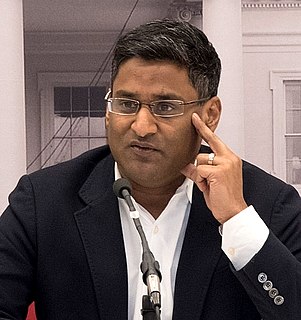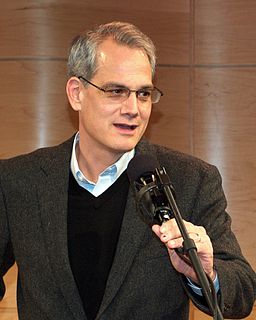Adam Clymer was an American journalist. He was a prolific political correspondent for The New York Times.

Ramesh Ponnuru is an American conservative political pundit and journalist. A visiting fellow at the American Enterprise Institute since 2012, he is also a senior editor for National Review magazine, a columnist for Bloomberg View, and a contributing editor to the domestic policy journal National Affairs.

Alex S. Jones is an American journalist who was director of the Shorenstein Center on Media, Politics and Public Policy at Harvard's John F. Kennedy School of Government from July 1, 2000 until June 2015. He won a Pulitzer Prize for journalism in 1987.

Hedrick Smith is a Pulitzer Prize-winning former New York Times reporter and Emmy award-winning producer and correspondent who has established himself over the past 50 years as one of America’s premier journalists. After serving 26 years with The New York Times from 1962-88 as correspondent, editor and bureau chief in both Moscow and Washington, Smith moved into television in 1989, reporting and producing more than 50 hours of long form documentaries for PBS over the next 25 years on topics from the inside story of the terrorists who mounted the 9/11 attacks and Gorbachev’s perestroika to Wall Street, Walmart and The Democracy Rebellion of grassroots citizen reform movements. Smith has authored five best-selling books including The Russians, The Power Game: How Washington Works, and Who Stole the American Dream, and co-authored several other books, including The Pentagon Papers and Reagan: The Man, the President. Smith is currently Executive Editor of the website ReclaimTheAmericanDream.org and the YouTube channel The People vs. The Politicians.

Annie Jacobsen is an American investigative journalist, author, and a 2016 Pulitzer Prize finalist. She was a contributing editor to the Los Angeles Times Magazine from 2009 until 2012. Jacobsen writes about war, weapons, security, and secrets. Jacobsen is best known as the author of the 2011 non-fiction book, Area 51: An Uncensored History of America's Top Secret Military Base, which The New York Times called "cauldron-stirring." She is an internationally acclaimed and sometimes controversial author who, according to one critic, writes sensational books by addressing popular conspiracies.
Thomas Byrne Edsall is an American journalist and academic.He is best known for his weekly opinion column for The New York Times online and for his 25 years covering national politics for the Washington Post.
Barry M. Rubin was an American-born Israeli writer and academic on terrorism and Middle Eastern affairs.
David Streitfeld is an American journalist. During his tenure as book reporter at The Washington Post, he definitively identified Joe Klein as the "Anonymous" author of the 1996 novel Primary Colors, upon which Klein admitted authorship, despite earlier denials.
Timothy P. Egan is an American author, journalist and op-ed columnist for The New York Times, writing from a liberal perspective.

Blake Bailey is an American writer. Bailey is widely known for his literary biographies of Richard Yates, John Cheever, Charles Jackson, and Philip Roth. He is the editor of the Library of America omnibus editions of Cheever's stories and novels.
Deena Guzder is a human rights journalist and author. Her work has appeared in Time, National Geographic Traveler, The Washington Post, United Press International, Reuters, Indian Express, Ms. Magazine, Global Post, Mother Jones, Huffington Post, Common Dreams, and elsewhere. She was awarded journalism grants from the Knight Foundation to report on theocracy and democracy in Iran; the Scripps Howard Foundation to report on low-caste "untouchables" in India; and, the Pulitzer Center on Crisis Reporting to report on commercial sexual exploitation and human trafficking in Thailand. Guzder was awarded a second Pulitzer Center grant to travel through Pakistan—from the southern tip of Karachi to the northern tip of Kohistan—to report for the Red Cross Red Crescent magazine on the value of volunteers during the 2010 Pakistan floods.

Edward W. Conard is an American businessman, author and scholar. He is the New York Times bestselling author of The Upside of Inequality: How Good Intentions Undermine the Middle Class and Unintended Consequences: Why Everything You've Been Told About the Economy Is Wrong; and a contributor to Oxford University Press’ United States Income, Wealth, Consumption, and Inequality. Conard is an adjunct fellow at the American Enterprise Institute for Public Policy Research. Previously, he was a managing director at Bain Capital, where he worked closely with former presidential candidate Mitt Romney.

David Meyer Wessel is an American journalist and writer. He has shared two Pulitzer Prizes for journalism. He is director of the Hutchins Center on Fiscal & Monetary Policy at the Brookings Institution and a contributing correspondent to The Wall Street Journal, where he worked for 30 years. Wessel appears frequently on National Public Radio's Morning Edition.
Danyel Smith is an American magazine editor and journalist. Smith is a 2014 John S. Knight Journalism Fellow at Stanford University. She is also writing a history of African-American women in pop music. Smith is also the former editor of Billboard and the first African-American editor of the magazine. Also, she is the former chief content officer of Vibe Media Group and former editor-in-chief of Vibe and vibe.com. She was the first African-American, and first female editor of Vibe.

Gregory White Smith was an American biographer of both Jackson Pollock and Vincent van Gogh. In addition to writing 18 books with Steven Naifeh, Smith was an accomplished musician, historic preservationist, art collector, philanthropist, attorney, and businessman who founded several companies including Best Lawyers, which spawned an entire industry of professional rankings.
John A. Glusman is vice president and editor-in-chief of W. W. Norton and Company, the largest independent, employee-owned publisher in the United States, and the author of Conduct Under Fire: Four American Doctors and Their Fight for Life as Prisoners of the Japanese, 1941-1945.
Ann Hornaday is an American film critic. She has been film critic at The Washington Post since 2002 and is the author of Talking Pictures: How to Watch Movies (2017). In 2008, she was a finalist for the Pulitzer Prize for Criticism.
Joan Doran Hedrick is a Pulitzer Prize-winning historian and biographer of Harriet Beecher Stowe and Jack London.
Carlos Eduardo Francisco Lozada Rodriguez Pastor is a Peruvian-American journalist and author and the nonfiction book critic of The Washington Post. He won the Pulitzer Prize for Criticism in 2019 and was a finalist in 2018. The Pulitzer Board cited his "trenchant and searching reviews and essays that joined warm emotion and careful analysis in examining a broad range of books addressing government and the American experience." He received the 2015 National Book Critics Circle Nona Balakian Citation for Excellence in Reviewing. Lozada is an adjunct professor of political science and journalism for the University of Notre Dame's Washington program. He is the author of What Were We Thinking: A Brief Intellectual History of the Trump Era, published in October 2020 by Simon & Schuster.








